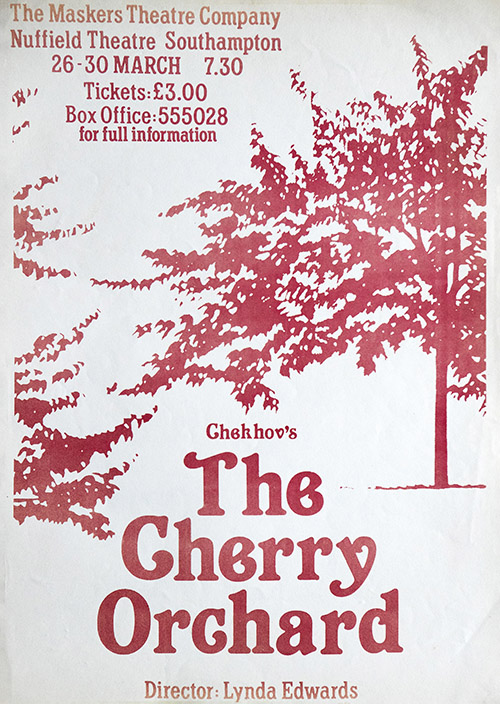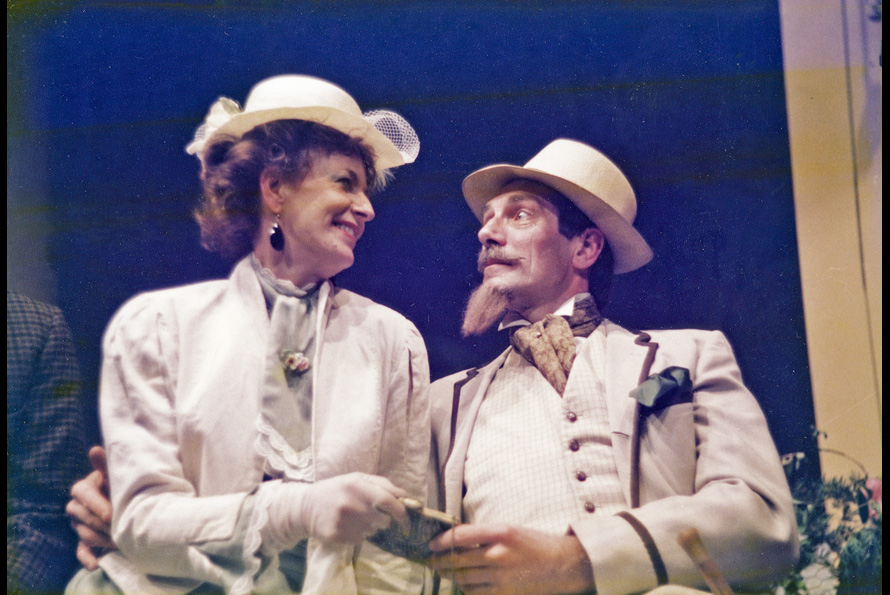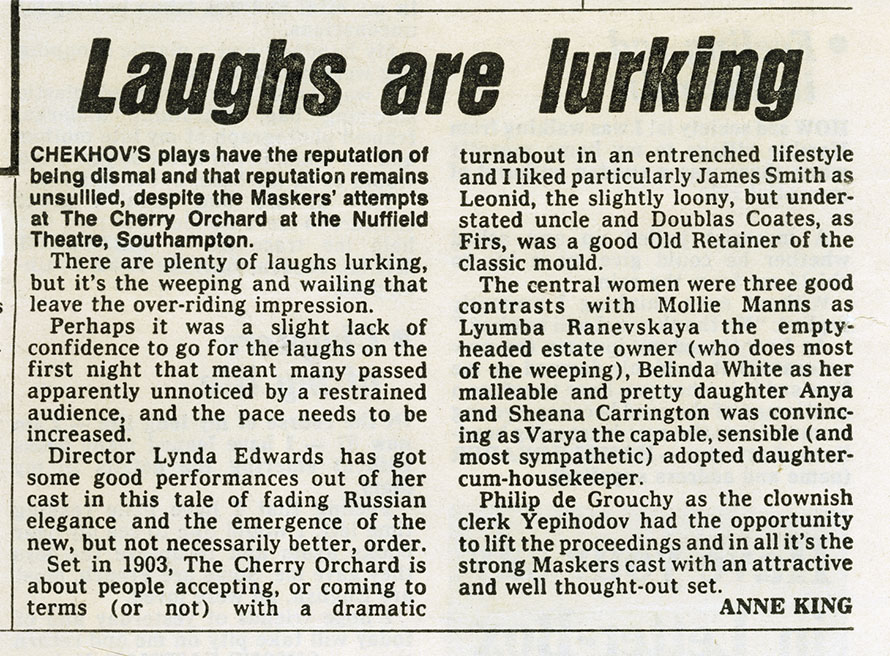The Nuffield Theatre
on26th to 30th March 1985

THE CHERRY ORCHARD
Chekhov’s final and most mature play is well structured and the balance beween comedy and pathos is finely held. We see clearly Chekhov’s gentleness and compassion as well as his objectivity. In the play we are shown the confusion of those members of the landed aristocracy who, at that time in Russia, were losing their money, their land, their status and their sense of order. Against these people we are shown the new, rising breed of progressive “builders of the future” - the question is posed whether a future built on the total destruction of the old order can be a “glorious” one.
This is a play about the new order versus the old order, about a cherry orchard which may or may not symbolise lost hopes, but most importantly it is about people, their quiet despair, their frustrations, their hopes, their weaknesses and their strengths. The wide range of characters which Chekhov uses to people his stage, from the quietly tragic to the loudly farcical create the illusion of life for us. “Life as it is - not on stilts”.
ANTON CHEKHOV
Anton Chekhov, Russia’s greatest dramatist, undoubtedly influenced the development of modern European drama. His new "drama of mood" touched playwrights from Gorky to Pinter. Born in 1860 in Taganrog, the third of six children, Chekhov developed an early flair for the dramatic as a skilled comic actor with an instinct for entertaining. After graduating as a doctor in 1884, Chekhov concentrated on short story writing during the 1880’s and became very successful in this field. He produced stories imbued with his own characteristic blend of poignancy, astringency, detachment and carefully controlled humour. He had previously written one full length play (Platonov 1881) and between 1888 and 1891 he wrote his famous one act farces including The Bear. However it was not until The Seasgull, was performed by The Moscow Arts Theatre in 1898 that Chekhov really received acclaim as a dramatist. This partnership with The Moscow Arts Theatre and, in particular with its director Stanislavsky, led to successful productions of Uncle Vanya, Three Sisters and finally The Cherry Orchard. Chekhov was a very sick man for most of his adult life and died shortly after finishing tonight’s play in 1904.
| Cast | |
| Lyuba Ranevskaya (an estate owner) | Mollie Manns |
| Anya (her daughter) | Belinda White |
| Varya (her adopted daughter) | Sheana Carrington |
| Leonid Gaev (Ranevskaya’s brother) | James Smith |
| Yermolay Lopakhin (a business man) | Bill McCann |
| Peter Trofimov (a student) | Peter White |
| Boris Simeonov-Pishchik (an estate owner) | David Jupp |
| Charlotte (a governess) | Jenni Watson |
| Simon Yepihodoy (a clerk) | Philip de Grouchy |
| Dunyasha (a maid) | Carol Clark |
| Firs (a manservant) | Douglas Coates |
| Yasha (a manservant) | Ken Hann |
| A passer-by | Derek Sealy |
| A Station Master | Chris Williams |
| A Post Office clerk | Rory Kinahan |
| Guests | Caroline Drinkwater, Jean Durman |
| For the Maskers: | |
| Director | Lynda Edwards |
| Designer | Ken Spencer with Imogen Hobbs, Julia Patterson |
| Stage Manager | Tony Lawther |
| Production Assistant | John Carrington |
| Properties | Enid Clark, Caroline Drinkwater |
| Assistant Stage Managers | Keith Larkin, Jan Ward, Tim Hobbs, Adam Hobbs, Tim Archer |
| Furniture | Jenni Watson |
| Lighting | Clive Weeks, Sue Cunningham |
| Sound | Angela Barks |
| Choreography | Pamela Sylvester |
| Guitar | John Murfit |
| Flute | Orin Stone |
| Wardrobe | Chris Baker, Janet Cairney |
| Publicity | Meri Lawther |
| Set Construction Manager | John Riggs |
Music used during the performance includes Russian folk songs sung by Ivan Rebroff and traditional Russian folk melodies recorded specifically for the performance
Click here to read the review!
click on a photo to enlarge it
.jpg)
.jpg)
.jpg)
.jpg)
.jpg)
.jpg)
.jpg)
.jpg)

